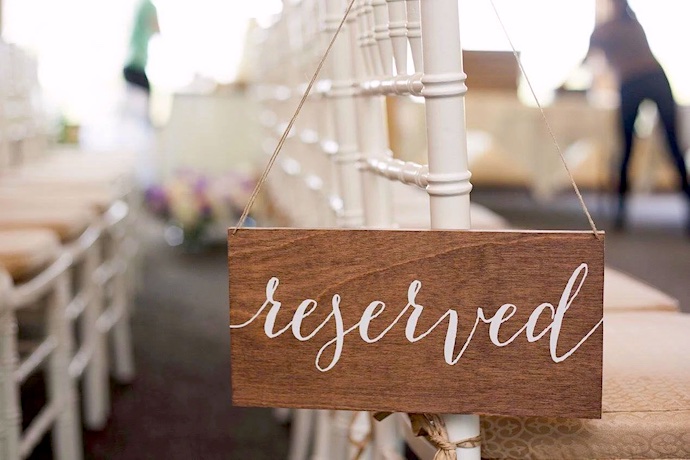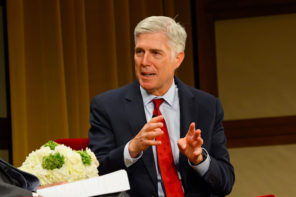On Tuesday, the Supreme Court heard oral arguments in 303 Creative v. Elenis, the latest case to pit the Christian Right against LGBTQ people. Or is it?
“Supreme Court Will Hear Latest Clash Between Faith and Gay Rights.”
“Masterpiece Cakeshop, 303 Creative and the conflict between religion, gay rights.”
To read major headlines on Tuesday, one might be forgiven for thinking that the 303 Creative case is about the right for conservative Christian business owners to deny goods or services to LGBTQ people. It’s way bigger.
Anti-LGBT legal goliath Alliance Defending Freedom (ADF) is representing Lorie Smith, a conservative Christian web designer who doesn’t want to make websites for weddings other than those between one cisgender man and one cisgender woman. Smith has never made a wedding website, nor have any non-approved couples asked for her services. But she wants to and she wants to be able to turn away any same-sex couples or other couples whose weddings she disapproves of.
Colorado law requires that businesses not discriminate against clients and customers on the basis of protected characteristics, including sexual orientation.
In 2016, ADF and Smith sued the state of Colorado in anticipation of Smith’s work being in violation of the state’s nondiscrimination statute. Upon hearing that Smith wanted a preemptive right to discriminate, the lower courts upheld Colorado’s law, agreeing that the state has a strong interest in protecting its residents from discrimination by Colorado businesses. In fact, the Tenth Circuit Court held that the state law passed “strict scrutiny”—the highest level of judicial review.
Laws limiting how much the government can infringe on someone’s religious exercise vary by venue, but they all require some balancing of the burden placed on the religious person against the importance of the law at hand. The importance of prohibiting discrimination in places of public accommodation is long-held precedent.
In fact, the Civil Rights Act of 1964 was passed due the powerful work of Black movements and leaders making the case that state-sanctioned discrimination in places of public accommodation like restaurants, businesses, hotels, etc, forces people out of the public sphere, effectively segregating.
While there is still some question as to what level of scrutiny is appropriate when reviewing laws that name sexual orientation and gender identity specifically, courts in the United States recognize the broad importance of protecting people from being turned away from shops in the public sphere, including on the Internet.
Religion is no blanket protection against the law. If you sell wedding websites in Colorado, you can’t pick which customers you want to purchase your websites.
Smith and 303 Creative lost in the lower courts when they tried to argue that Smith’s desire to discriminate was more important than protecting Coloradans against discrimination. In fact, they lost so badly that the appellate court said the Colorado law survived the highest level of scrutiny a court can use.
So Smith and ADF asked the Supreme Court a question that they all knew would be a sidestep from the religious balancing act: whether Smith had a right, as an artist, to be free from being told what—or what not—to say by the state of Colorado. Smith argues that she’s a wedding artist and that if she’s required to offer wedding website templates to same-sex couples, Colorado would be forcing her to “speak” under the First Amendment, against her will.
Now, ADF and Smith and the conservative justices all have a strong interest in framing the national conversation around religion, even as they lose the legal conversation. The free speech argument isn’t a very compelling one, so it makes sense to keep the conversation focused on religion. But Smith wants to have it all: to be an artist who’s creating out of the depths of her soul and the owner of an LLC registered in Colorado, subject to the state’s rules and regulations.
Which is it? Does Smith want the freedom of an artist to make art about what and for whom she pleases, or does she want the protections and rights of a registered business?
Colorado isn’t telling Smith she must endorse same-sex marriages, or even that she has to make a wedding website for a same-sex wedding. Colorado is telling her that if 303 Creative sells wedding websites to different-sex couples, it cannot, under state law, turn away a same-sex couple from buying the same wedding website. That would be impermissible discrimination.
The second incentive the Christian Right has to keep the focus on religion instead of free speech is because the implications if Smith wins on the free speech argument are, frankly, unthinkable. A win for Smith would bore a hole right in the center of nondiscrimination laws—nondiscrimination laws for all, not just for LGBTQ people—no matter what ADF want us to think. A win for Smith would, by some measures, create an entirely new class of rights: artists who can discriminate.
The third incentive the Christian Right has to keep the focus on religion instead of free speech is that a focus on religion allows the Christian Right to give their arguments the appearance of a broader base of support. This isn’t (just) a conversation about religion, this is a conversation about Christianity. And more precisely, a very narrow theological interpretation of the Bible that a minority of Christians uphold.
So it’s not just “artists who can discriminate,” it’s a new class of “conservative Christian artists who can discriminate—and oh yeah, an artist is anyone who makes anything so now anyone can discriminate against any client for any reason.” As a strategy it’s as shrewd as it is disingenuous.





